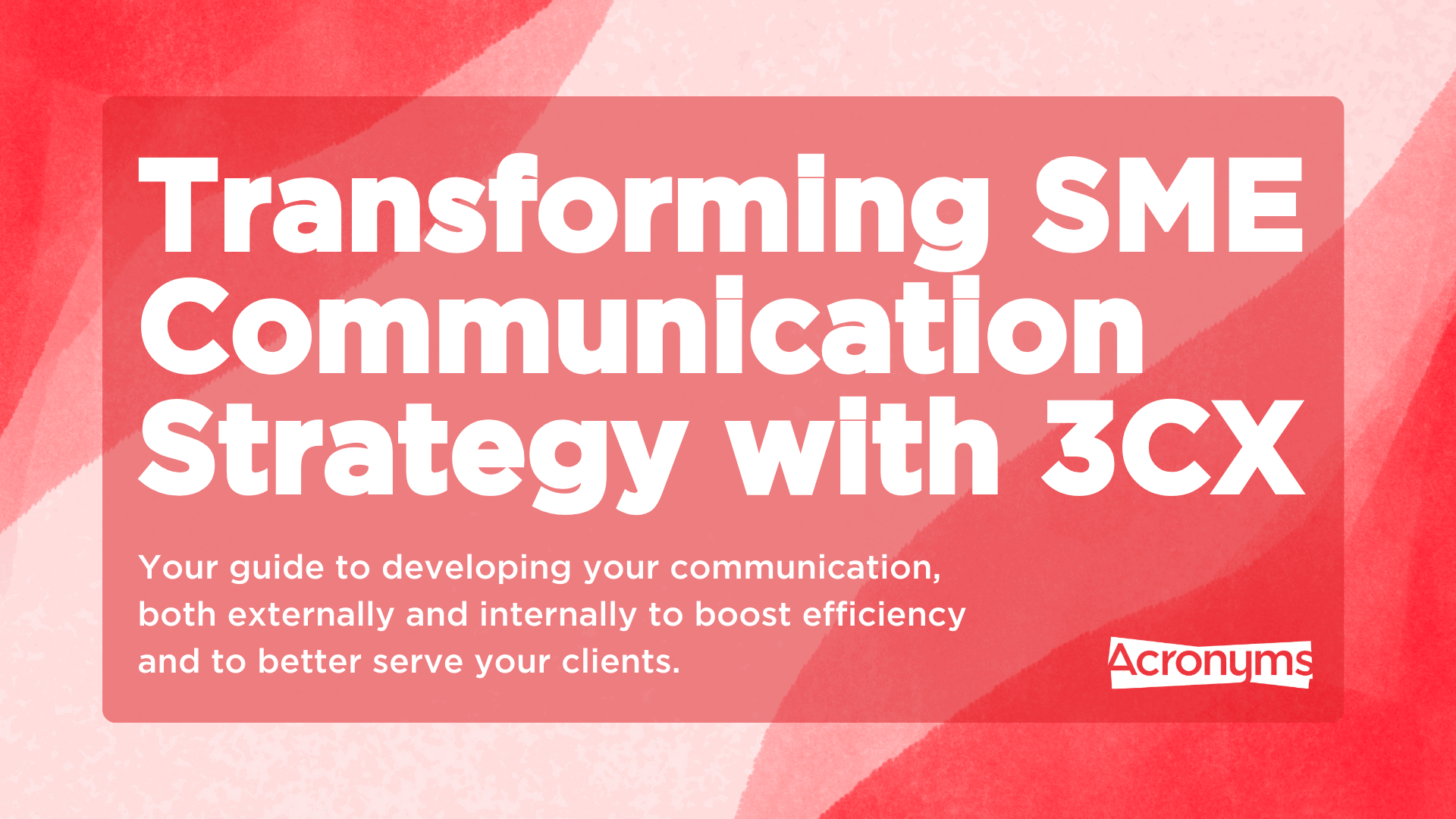What Are The Benefits of VoIP For Business?
In today’s fast-paced, data-driven climate, modern businesses are continually seeking new ways to enhance their communication systems and further streamline their operations. For many businesses, the solution lies in VoIP – also known as VoIP for business, VoIP telephony or Voice over Internet Protocol.
In just a few short years, VoIP has very quickly replaced the traditional phone lines of many businesses. In fact, it’s currently considered the best solution to the much talked about ISDN Switch Off. If your business has a remote or hybrid workforce, is using an outdated telecom system or is simply looking for better ways to collaborate and communicate, VoIP may be the solution you’re looking for.
As with any new IT infrastructure, there is much to consider when it comes to introducing VoIP to your business. So what is VoIP? And what are the benefits of VoIP for business?
What is VoIP?
In simple terms, Voice over Internet Protocol, more commonly known as VoIP telephony or simply VoIP (pronounced ‘vooip’), allows businesses and organisations to make and receive phone calls over the internet. While you can still choose to have a hard phone with VoIP, many businesses opt for a softphone meaning employees can place and take phone calls as well as record messages and access their voicemail through an online network.
VoIP is a very reliable form of communication for businesses and can make a great replacement for traditional phone lines. With a stable internet connection, you can rely on VoIP to provide high-quality phone calls whilst also benefiting from additional features, such as call recording and custom caller ID. Using VoIP, voicemail messages can also be sent directly to your email, which can be accessed anywhere with an internet connection. These features are made possible by using the internet instead of old copper cables.
The ISDN Switch Off
Currently set for 2025, the ISDN Switch Off is the copper-based system that has supported telephone networks for several decades. As the technology no longer has the scope nor the capability to keep up with modern demand, the switch-off will see an end to traditional phone systems as we know them.
In a nutshell, VoIP is the future. If your business is hoping to not only keep up but stay ahead of the tech curve, there’s never been a better time to make the switch.
VoIP features
Whilst additional features can vary from provider to provider, some of the core features that a business may benefit from include…
- Call Screening – Screen telephone calls with the click of a button, diverting incoming calls and recognised callers to different handsets, mobile phones or mailboxes.
- Voicemail to Email – Voicemail recordings, or in some instances transcriptions, can be sent to an email address, ensuring users never miss an important message.
- Do Not Disturb – Individual phone lines can easily switch to ‘Do Not Disturb’ and other statuses based on a user’s wishes or behaviour such as when presenting or in a video call on a different platform.
- Multiple Platforms – The same phone line can be used via a traditional telephone handset, a mobile device or on a desktop or laptop with a headset, based on the preference of the user.
- Call Conferencing – Call conferencing can be set up with ease to incorporate internal and external numbers and a range of different handset types.
Business VoIP Systems
VoIP phone services have taken business communications technology to a whole new level. Modern business VoIP systems often combine voice calling with video, chat, SMS and integrations with other business software, such as CRM systems. These VoIP systems are often referred to as Unified Communications as a Service (UCaaS).
Unified Communications as a Service (UCaas)
UCaaS is a comprehensive communication solution provided by many VoIP service providers. It aims to enhance voice calling and elevate business communications beyond traditional phone technology. UCaaS solutions provide a unified platform for all communication and collaboration needs. This can improve efficiency and productivity for businesses by reducing the need for multiple separate tools and systems.
Essential functions of a UCaaS include:
- Chat – Instant messaging connects team members in real-time across multiple locations, offering individual and group messaging, team channels, and embedded file-sharing for seamless communication.
- Voice – Services such as call forwarding, conference calling, recordings and advanced routing facilitate fast decision-making for businesses. UCaaS uses VoIP technology for voice capabilities.
- Video – Enables face-to-face online meetings for teams, even across different time zones. Advanced features like screen sharing, recordings and chat enhance collaboration efficiency.
- Collaboration – Features like calendars, file sharing and project management tools streamline cross-functional work and goal alignment for employees.
Business VoIP systems have surged in popularity, saturating the market with a wide range of options. While some serve as general-purpose digital calling systems, others cater to a specific user group, like call centres or industries with heightened security requirements. Microsoft Teams is a popular choice for most SMEs, due to its seamless integration with various Microsoft products and services, including Office 365 and OneDrive.
Why use VoIP For Business?
VoIP telephony delivers high call quality, serving as a dependable and secure alternative to bulky and outdated hard phones. With its cloud-based technology, employees can connect with their team from any location with an internet connection, making it an ideal choice for remote or hybrid workers. Other advantages of VoIP include…
Reliability
The reliability of VoIP is determined by the quality of your internet connection. This means if your business internet is stable and has enough bandwidth, your VoIP phone system will be reliable. It also means an unstable internet connection can lead to issues such as call drops or poor call quality. As a result, challenges with your VoIP telephony network can often be remedied by simply upgrading your internet connection to a leased line connection.
Fewer overhead costs and heightened flexibility
As VoIP telephony is a relatively new technology, you may think it would be more costly than a hard phone. In reality, VoIP is a lot cheaper than a traditional landline.
In contrast to line rental charges and the additional cost of each call, VoIP can be tailored to the needs of you and your business. Working much like a mobile phone contract, you will receive a bespoke bundle that includes additional features and perks. You also won’t need to purchase physical handsets or a hard phone unless you specifically need it – it’s as simple as plugging your headset into your work computer.
Better business continuity
A VoIP telephone system can cement business continuity in your day-to-day operations in ways traditional phone communications cannot. For example, if you lose your internet connection, there will typically be a practical and cost-effective solution compared to the process of fixing a broken phone line. As a result, you will experience minimal downtime – especially if you have an IT support company like Acronyms to resolve the issue for you.
More mobility
In this day and age, flexibility and mobility are crucial for small and large businesses alike. Fortunately, VoIP telephony is a scalable, flexible tool that can be easily implemented within your operations.
VoIP is most often implemented and managed by IT support companies on behalf of a business. Most professional IT support teams will be able to create a bespoke VoIP package and tailor it to your business’s needs. This gives you and your employees added flexibility when it comes to your overhead costs as well as additional perks and features traditional communication networks can’t offer.
As VoIP relies on the internet to function, it’s easy to scale your system up and add more employees as your business grows. VoIP also easily integrates with work mobiles and as a result, allows for added mobility. This means your employees will be able to access your network from anywhere, which is ideal as the world increasingly moves towards hybrid and remote working.
How much does VoIP cost?
While the initial investment in setting up a VoIP system may seem higher than that of a traditional landline, the long-term costs are significantly less. Unlike traditional phone systems, VoIP doesn’t require expensive hardware, additional phone lines or extra maintenance fees. Your business will also be able to make unlimited local and long-distance calls at a much lower cost – often with predictable monthly bills.
VoIP at Acronyms IT Support
In this day and age, it is critical for large and small organisations to stay ahead of the tech curve. Keeping your digital assets and IT infrastructure up to date and managed proactively has a number of advantages for your business, from nurturing growth to maintaining continuity in your day-to-day operations. With that in mind, and with the demise of ISDN on the horizon, there’s never been a better moment to integrate VoIP telephony into your daily business operations.
Since 2003, Acronyms IT Support has been helping businesses and organisations in the South West manage their IT infrastructure. Our team of technicians, engineers, and consultants can provide your business with a selection of digital solutions and services, including hosted VoIP services, that can give your business the foundations it needs to thrive and grow in the digital era.
If you’re ready to make the switch or have any questions about any of the other services we have to offer, please book a no-obligation consultation with the team today.
Alternatively, here are a number of resources you might find useful:
Frequently Asked Questions
-
What VoIP phone system is right for my business?
At Acronyms, we believe that making a phone call should be simple, worry-free and affordable. That's why we've partnered with 3CX, a leading VoIP telephony service renowned for its user-friendly interface and powerful features. With 3CX, your business gains access to a versatile phone system that adapts to your business needs.
Our partnership with 3CX includes on-going technical support from Acronyms. Our dedicated support team is always available to assist you, should you have an issue with your phone or how to use it.
VoIP phone systems don’t have to be confusing. Contact a member of your closest branch to begin your telephony journey with Acronyms.
-
What are the benefits of using VoIP for my business?
VoIP phone systems are a flexible and efficient communication solution for businesses. One main advantage of VoIP is its ability to integrate with existing business systems, operations and software. This seamless integration means you don't have to worry about disrupting any of your existing communication systems or having to start all over again with certain functions, minimising downtime.
Additional benefits of VoIP business include lower costs, scalability, advanced features and reliability.
-
Is VoIP compatible with my existing internet connection?
A stable and high-speed internet connection is essential for VoIP calls to ensure good call quality. Whilst it’s not a strict requirement, we’d also recommend that businesses looking to use VoIP technology invest in a leased line internet connection to ensure their service is reliable.
-
How does VoIP actually work?
When you speak into a VoIP-enabled device, such as a computer or smartphone, your voice is converted into digital data. This data is broken down into small packets and sent over the internet to the recipient's device. At the recipient's end, the digital data packets are received and reassembled back into voice signals. The recipient then hears your voice through their device's speakers or headphones.
VoIP technology leverages the internet's infrastructure to transmit voice data efficiently and cost-effectively. It also offers additional features like call forwarding, voicemail and video conferencing, making it a versatile and popular choice for both personal and business communication.






